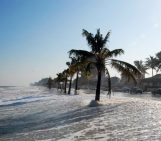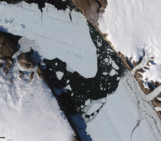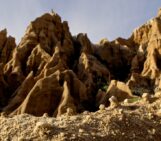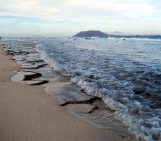
Hello Shradha – welcome to GeoTalk. Before we kick off, could you introduce yourself to our readers?
Hi Simon and thank you for inviting me to the GeoTalks Series. I am Shradha Menon and I I am from Kerala, a state in the southern part of India. I am a geologist at heart and my side quests include archaeology as well. I am currently pursuing a PhD in carbonate sedimentology at the Indian Institute of Technology (IIT) Gandhinagar, Gujarat, India. My research investigates the evolution of the Lakshadweep Archipelago, atoll islands off the western coast of the Indian subcontinent. These small coral islands (32 km²) are considered vulnerable to risks due to climate change and my research involves studying the interplay of site-specific and global factors in discerning island stability across both the Recent and Quaternary timescales.
Apart from these, I have worked to engage in activities and programs aimed at motivating the student community at my institute to spark interest in geology, by combining fun activities and programs. Through this approach, I hope to inspire and enable students to gain new perspectives and solutions to challenges in the field. Overall, I hope to continue to pursue research in geology (and sedimentology), while also engaging in outreach to encourage more people to take up research in geology and the earth sciences.
Can you explain what Atolls are, including how they relate to island ecology and society?
Atolls are basically ring-shaped coral rims that encircle a lagoon. The rims are usually comprised of islands. The lagoon and the coral rims host a multitude of marine species that provide vital sources of livelihood (raw materials, fisheries and so on) for the island inhabitants. Moreover, the islands grow by a constant sediment supply that is majorly derived from the coral reefs as well as the benthic organisms (such as molluscs and algae) associated with the reefs. This makes sediment production and redistribution crucial in island evolution and stability. In addition to this, coral reefs protect the islands from storm surges and provide essential security to these low-lying islands. Thus, the atolls are deeply connected with the island’s ecology and human livelihood.
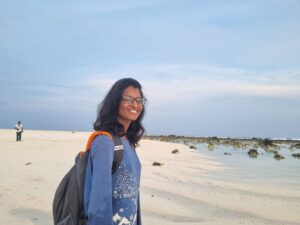 However, coral reefs are sensitive to environmental changes, such as ocean warming, ocean acidification, and sea level rise, among others. This then will eventually adversely affect island resilience in both short (decades to centuries) and long timescales. Even in the Lakshadweep Archipelago, where my research is based, it has been amply observed that short-scale local variations in sea surface temperatures have led to coral mortality and reduction in benthic organisms, negatively affecting sediment production and distribution.
However, coral reefs are sensitive to environmental changes, such as ocean warming, ocean acidification, and sea level rise, among others. This then will eventually adversely affect island resilience in both short (decades to centuries) and long timescales. Even in the Lakshadweep Archipelago, where my research is based, it has been amply observed that short-scale local variations in sea surface temperatures have led to coral mortality and reduction in benthic organisms, negatively affecting sediment production and distribution.
This has serious repercussions on the island ecology with widespread erosion or sediment migration, with consequences for social and economic livelihood. Another point to note is that even in modern ecosystems, the responses to environmental variations and climate change are non-uniform and are dependent on a suite of site-specific and global factors and their mutual interaction. Thus, this makes it all the more important to study atoll systems, both modern and the past, to discern the factors and responses of various atolls to different environmental factors. This, then, would help give an adequate understanding of the future trajectory of the islands. This is especially important for low-lying small atoll islands whose sole source of resources and livelihood is the coral reefs and the ecology associated with them. Studying the evolution of the atolls will enable the adoption of sustainable mitigation strategies (tailored for the atoll ecology). This is essential to protect the atolls and the human populations that call the atoll islands their home.
How has human activity – including climate change – impacted Atolls and what does this mean for their inhabitants?
Climate change and human activities present considerable challenges to low-lying coral islands and atolls that heavily depend on the reef systems for their sustenance. Ocean warming and acidification exacerbated by climate change have led to widespread coral mortality and lower recovery rates after each bleaching event. Although molluscs and other microfossils (such as foraminifera), have a greater range of habitability in terms of sea surface temperatures and salinity, these undergo dissolution with slight changes in pH. Additionally, rapid sea level rise can lead to reef drowning and consequent coastal inundation. Besides these, human activities such as dredging and other infrastructure programs can lead to variations in ocean parameters, affecting sediment production and redistribution, so vital for the atoll islands. Eventually, these effects can compound, rendering the islands uninhabitable in the long run. Further, even well-intentioned, understudied conservation interventions can lead to negative effects. Case in point, in the Lakshadweep Archipelago, widespread conservation of sea turtles led to the overgrazing of seagrass. The seagrass hosts several species of molluscs, forams, and algae. With the loss of sea grass, the in-situ production of these organisms has affected sediment
production.
The loss of reef cover and reduction in sediment production due to anthropogenic activities will translate to a loss of land cover for the inhabitants, leading to widespread migration. While atoll islands become more vulnerable to climate change, it becomes vital for the inhabitants to actively participate in the mitigation efforts as they become the first responders to the effects of climate change. Thus, it is important for researchers to also take up an active role in informing the general public of their research and engaging with the people so as to make informed decisions.
You’re scientific division – Stratigraphy, Sedimentology and Palaeontology (SSP) –gains insights by delving deep into Earth’s geologic history, both living and non-living. How does such research help inform our understanding of current and future challenges?
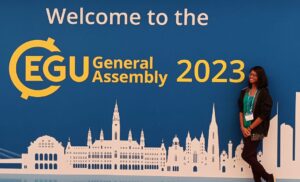 Yes, the SSP division largely caters to research that spans a wide range of timescales, from billions to millions of years ago to the recent. The research is a record of the earth, and the researchers are essentially curators of the museum that is Earth. Studying deep geological history plays a crucial role in understanding Earth’s processes and responses. The present is the key to the past, and vice versa. Understanding the past can offer valuable insights and solutions to contemporary issues, particularly regarding climate change and resource and energy management. One of the key areas in which researching the deep past is pertinent is in the context of climate change, chiefly modeling earth systems and their responses. This is crucial for future human habitability, resource and economic management, and understanding the complexities of human migration. Even now, several variables for adequately modeling future climate shifts have not been deciphered properly and thus, the study of the past is vital to close the gaps. Further, these are important for the utilization of resources for sustainable energy practices, which again has important implications for human habitability.
Yes, the SSP division largely caters to research that spans a wide range of timescales, from billions to millions of years ago to the recent. The research is a record of the earth, and the researchers are essentially curators of the museum that is Earth. Studying deep geological history plays a crucial role in understanding Earth’s processes and responses. The present is the key to the past, and vice versa. Understanding the past can offer valuable insights and solutions to contemporary issues, particularly regarding climate change and resource and energy management. One of the key areas in which researching the deep past is pertinent is in the context of climate change, chiefly modeling earth systems and their responses. This is crucial for future human habitability, resource and economic management, and understanding the complexities of human migration. Even now, several variables for adequately modeling future climate shifts have not been deciphered properly and thus, the study of the past is vital to close the gaps. Further, these are important for the utilization of resources for sustainable energy practices, which again has important implications for human habitability.
Overall, the study of the deep past offers insights for a wide range of interdisciplinary subjects, with an adequate geological understanding enabling answering questions on a wide variety of social and economic challenges.
You’re also the Early Career Scientist representatives for SSP division. How do you hope SSP communities moving towards in the future, and how can people get involved?
As an SSP division ECS, I hope the SSP community can grow, both in terms of ECS contributions and the amount of novel research that can be widely disseminated. This can be accomplished through stronger engagement and collaboration among the community in terms of blog posts, online webinars and peer-to-peer events, and social media outreach. If you are willing to contribute or are even just curious and want to sneak a peek into our community, we wholeheartedly welcome you all. To support us or become a part of the EGU SSP community, you could reach out to me anytime, with any queries or suggestions to widen the scope of the division. As an ECS, I also hope to promote equality, diversity and inclusion across all divisions. All we require is a spark of interest, and we aim to build a collaborative community in which knowledge and ideas flourish. Help make a difference in the EGU and SSP Community by joining us!

